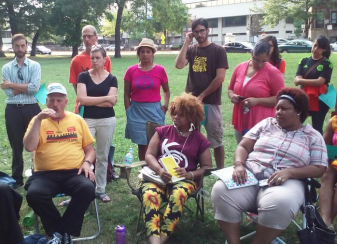Police hunting the killers of an Illinois cop may have caught a break when a resident in the area of the murder turned over security footage that could have captured the individuals responsible.
George Filenko, commander of the Lake County Major Task Force, said during a Thursday afternoon press conference that a “private resident” turned over “home video security footage” Wednesday night that allegedly showed “individuals” in the area where Lt. Charles Joseph Gliniewicz was shot and killed Tuesday morning.
The suspects have been described only in vague terms so far as a black male and two white males. That description is based on what Gliniewicz radioed to his dispatcher before he was killed.
Filenko twice described the development as “significant,” and said the footage had been turned over to the Department of Homeland Security.
“Homeland Security has got advanced equipment,” Filenko said. “This video in particular is on a particular type of hard drive that they have the technology to retrieve it off of.”
Filenko said, in his experience, some home security systems are more advanced than those employed by businesses.
“Some of those are very sophisticated, they’re high-definition security systems,” he said.
While it was initially reported that Gliniewicz was found stripped of his gun, and possibly his pepper spray and police radio, Filenko said Gliniewicz’s gun had been “recovered” and didn’t believe there was now any equipment missing from the scene. While he wouldn’t describe the suspects as “armed,” he still cautioned the public to be wary if they believe they’ve spotted any of them.
“I would consider anybody who murdered a police officer as being extremely dangerous,” said Filenko, who added that there's a "good probability" the suspects are "still somewhere in the area."
Filenko told CNN on Wednesday night that authorities believed the suspects may have been familiar with the area where they encountered and ultimately murdered Gliniewicz.




 Kristen McQueary
Kristen McQueary







![Chicago skyline [Getty Images]](http://cdn01.dailycaller.com/wp-content/uploads/2015/08/Chicago-e1439318427720.jpg) .
.



